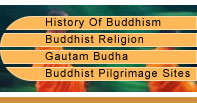Buddha
The founder of Buddhism was Buddha, originally known as Prince Siddhartha. He was born in a royal family with all the luxuries of life at his disposal. However, by the age of 29, he encountered the harsh realities of life and left his luxurious home to find the real meaning of life. After following a path of first, rigorous austerity and then meditation, He finally attained Enlightenment under the Bodhi tree in Gaya. After attaining enlightenment, He preached others to follow the same path and thus, laid the foundation of Buddhism.
The Four Noble Truths
Summarizing the essence of Buddhism in themselves are The Four Noble Truths of Buddhism. They consist of
- The Noble Truth of Suffering (Dukkha)
- The Noble Truth of the Origin of Suffering (Samudaya)
- The Noble Truth of the Cessation of Suffering (Nirodha)
- The Noble Truth that leads to the Extinction of Suffering (Magga)
The Five Precepts of Buddhism, in general, consist of five abstentions, including…
- Abstain from harming living beings. This includes human beings, animals and insects. However, Buddhists can eat meat, if the being has not been killed for them specifically.
- Abstain from stealing, which means not taking what is not given.
- Abstain from sexual misconduct. This includes being unfaithful to one's partner, involvement with prostitution or pornography, immoral thoughts, etc.
- Abstain from false speech, which includes lying, gossiping, etc.
- Abstain from intoxicating drinks and drugs, except those taken for medicinal purposes.
The three marks of existence comprise of anicca (impermanence), dukkha (suffering) and anatta (no-self). It is said in Buddhism that there is no self because there is impermanence and because there is impermanence, there is suffering.
Reincarnation
Buddhist belief of reincarnation means that the consciousness of a person remains even after he is no more. It even manifests in his future life.
Karma
The concept of Karma means that what we do in our present life will have a bearing on our future life.
Compassion and Loving Kindness
Lord Buddha has preached people to assume the feelings of compassion and loving kindness towards all human beings. Compassion means identifying with the suffering of others and wishing that the suffering would come to an end. Loving-kindness means showing care, consideration and concern towards others. These feeling should be extended to each and every human being, without exception.
Meditation
Meditation is considered as one of the necessary practices that can lead us to enlightenment. Even Lord Buddha practiced meditation when He was striving for enlightenment. In Buddhism, the technique of meditation holds a lot of importance, for both a beginner as well as others.
Buddhist Scriptures
Buddhist scriptures consist of all the religious texts and scriptures that form a part of the religion.
Major Schools
The two major schools of Buddhism are Theravada or Hinayana and Mahayana.




